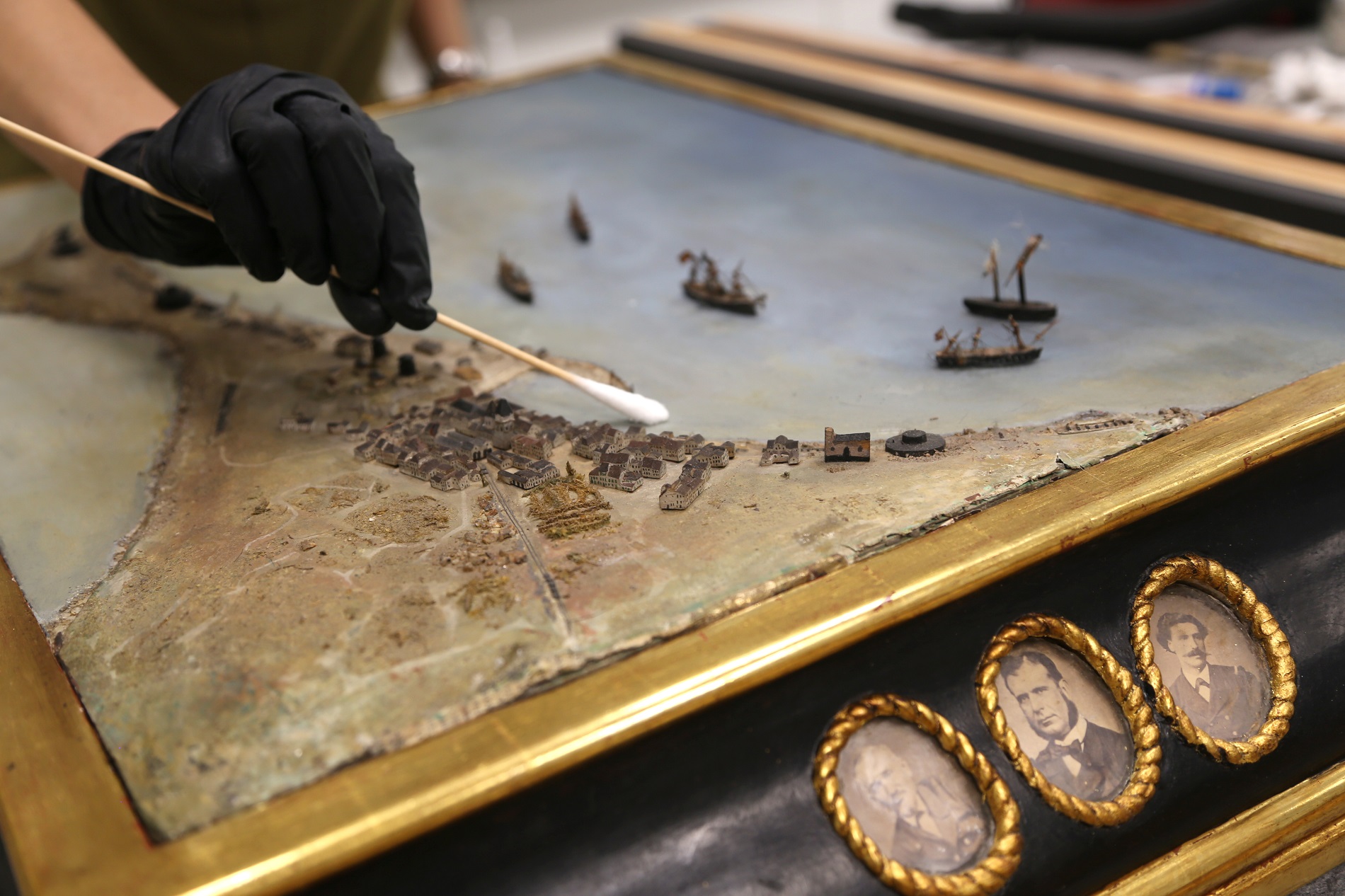Organisation chart

Royal Decree 596/2014, of 11th July, defines the composition and functions of the Naval Museum governing bodies: the Royal Board of Trustees and the Directorate. The organisation of the Museum's internal work has a two-fold structure: its functions as a museum, and its various types of collections.
In terms of functions, there are four technical areas in the Museum: documentation, conservation, research and cultural action. The four areas provide crosscutting service to all the Museum's holdings, which are of different types of collections.
Governing bodiesThe Naval Museum's governing bodies are its Royal Board of Trustees, and its Directorate.
- Royal Board of Trustees
The Naval Museum's Royal Board of Trustees is a collegiate governing body whose composition is regulated by Royal Decree 596/2014 of 11th July 2014. Its functions include defining the Museum's general guidelines for action, approving its annual plan of activities, promoting the acquisition of objects destined to form part of the Museum's holdings, and accepting loans.
President: H.M. King Juan Carlos I
Vice President: Director of the Naval Museum
- Directorate
The Director of the Naval Museum is responsible for directing and coordinating the functions and activities of the Museum, drawing up and proposing the annual plan of activities, and promoting cooperative relations with other Museums, institutions and research centres, among others.
The Museum also has a technical directorate that provides support regarding the promotion direction and coordination of its different areas.
Director: Captain Juan Escrigas Rodríguez
Technical Director: Berta Gasca Giménez (in charge of the Painting and Sculpture collections) bgasgim@fn.mde.es
The documentation area is the operational core of the Museum. It is conceived in a double sense: on the one hand, it creates, compiles, orders and manages the information derived from the Museum's activity; and, on the other hand, it registers and documents the collections.
Among the priority functions entrusted to this area are the entry, inventory, description and catalogue tasks for the items that are part of the Museum's holdings, both those in the permanent collection, which is continually increasing thanks to donations and acquisitions, and those temporarily on loan or bailment.
The area is also responsible for the management of information media and tools to ensure full accessibility to the collection. To this end, the Ministry of Defence's museums use the MILES system, an internal computerised inventory. In addition, the documentation area of the Naval Museum manages the documentation of the Navy's movable property as a whole.
Technical team:
Santiago Rumeu Casares (in charge of the Weapons and artillery collection) srumcas@fn.mde.es
Inés Abril Benavides (in charge of the Decorative Arts and Historical Memorabilia collections) iabrben@mde.es
Conservation area
The mission of the conservation area is to ensure the physical integrity of the collections, whatever their location and during any process to which they are subjected. In order to fulfil this task, work is structured in three levels of action: preventive conservation, remedial conservation and restoration of the collections.
Some of its functions are preparing the collections protection plan and the annual restoration programmes, planning and controlling internal and external movements, and developing cleaning and environmental control procedures for rooms and storerooms, among others.
Conservation and restoration work is usually carried out by Museum's staff in the restoration workshops. Sometimes these interventions are carried out in collaboration with the Spanish Cultural Heritage Institute or with professionals and specialised companies contracted for this purpose.
Technical team:
Sheila Reinoso Blázquez (in charge of the Etnography, Underwater Archaeology, Medals and Numismatic collections) sreibla@mde.es
Regina Zurdo Menéndez (conservator-restorer of cultural heritage) mzurmen@mde.es
María José García Mora (conservator-restorer of cultural heritage) mariajose.garcia@mde.es
Research areaResearch is the basis for generating knowledge within the Museum. This area develops a crosscutting function throughout the Museum, covering its collections and its history, as well as its activity.
The research area coordinates the internal research programmes for the collections and research projects in collaboration with external agents. It also provides support to researchers who request it.
Internally, the research area collaborates with the heads of the different collections in their scientific study, and is responsible for establishing what is needed to increase the Museum's collections, and for the scientific supervision of its publications, among others.
Technical team:
José María Moreno Martín (in charge of the Scientific Instruments and Cartography collections) jmormar@fn.mde.es
Cultural action areaThe function of the cultural action area is to act as a mediator between the Museum's collections and the public, with the ultimate aim of bringing the Museum closer to society and improving users' knowledge of the collections and their importance and significance.
Therefore, this area is in charge of designing new content about the Museum's collections, and adapting them to different formats, platforms and audiences, both in the Museum's physical and virtual environments, ensuring that any information transmitted meets quality standards.
Some of its functions are designing content for both internal and external digital platforms, improving the content and presentation of the information visitors receive at the Museum, designing and coordinating educational and cultural activities to allow a greater knowledge of the collections, and reaching new audiences, as well as carrying out scientific study of the characteristics, needs and motivations of the public.
Technical team:
Blanca Sazatornil Pinedo (in charge of the Engraving, Drawing and Civilian Shipbuilding collections) bsazpin@mde.es




